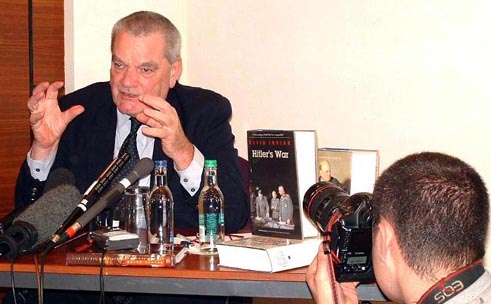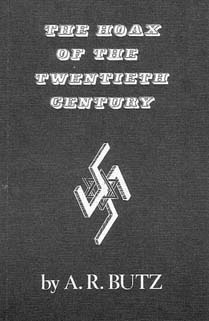|
Jailing Opinions
reviewed by Arthur R. Butz,
originally published in Smith's Report
No. 135, Jan / Feb 2007
and on www.codoh.info
click here for details of international availability and postage rates for Jailing Opinions
Jailing Opinions. A documentary exploring the criminalization of normal historical enquiry and expression, including first-hand accounts from those who attended the trial of British historian David Irving who was incarcerated in Vienna, Austria, and from attorneys persecuted for their defence of Canadian resident Ernst Zündel and American resident Germar Rudolf and others who remain incarcerated in European prisons for talking about events that happened (or not, as the case may be) more than sixty years ago.
My earlier review (SR #133, November 2006) is assumed fresh in the mind of the reader. Again I shall use the term "revisionist" as synonymous with "Holocaust revisionist" and "Holocaust denier", and I apply "confrontation" and "credentials" as important tests in evaluating a DVD intended for the layman viewer.

Prof. Butz notes that DVD producer Lady Renouf "applied well" her
background as
a model and actress in advertisements
This DVD is generally professionally done. In its production Lady Renouf applied well her background as a model and actress. For example there are observations made, relating to the subliminal aspects of the media treatment of the persecution of revisionists, that I would not have noticed unaided.
David Irving was arrested in Austria in November 2005 for denying, in 1989 in an exchange with a Vienna journalist, that there were gas chambers at Auschwitz. In February he was sentenced to three years imprisonment. His case is the basis of this DVD. The case of Ernst Zündel is also treated but only to a relatively small extent, and the case of Robert Faurisson gets even less notice. This review, therefore, is mainly an exercise in weighing David Irving and our relationship to him.
Submission of this review was delayed by the editor's participation in the Tehran conference and by the Christmas holiday. When during that recess Irving was released on probation hasty changes were required here.

Deborah Lipstadt celebrates her libel
victory over David Irving in 2000
Lady Renouf has been closely associated with David Irving since the Lipstadt trial in 2000, when she was attracted to the case by Irving's public comments that Jews should be more concerned with why they are scorned rather than how. At Irving's invitation, she sat at his side throughout the trial. After Irving lost this civil action, Renouf invited Irving and Count Nikolai Tolstoy (a long-standing family friend) to a Russian dinner-discussion at the elite Reform Club on London's Pall Mall, where she was a member of ten years standing. Both historians sat as her guests at that evening's Current Affairs Society top table. The following day a cabal demanded, and got, Irving's banning from future Club functions, but failed to get Renouf's expulsion. However after her nomination to an important committee had again made her membership controversial, an amplified campaign succeeded in winning her expulsion in 2003.
Renouf was studying for a Master's degree in Psychology of Religion at Heythrop College of the University of London during 1999 - 2001 when she was asked to "study elsewhere".
She has visited jailed revisionists in Austria and Germany and attended the July 2006 trial of Robert Faurisson in Paris. In summary, Lady Renouf knows the score because she learned it the hard way or, if you wish, the easy way.
David Irving is a military historian of major achievement. Prof. Harold C. Deutsch, a President of the Conference Group on Central European History, an important official of the wartime OSS and later an interrogator of Nazis at Nuremberg, and then at the U.S. Army War College, wrote (American Historical Review, June 1978, p. 758) that Irving's book on Field Marshal Erwin Rommel, entitled The Trail of the Fox
is another example of extraordinary enterprise and ingenuity in ferreting out material others have overlooked or have resigned themselves to do without. His success here is as dazzling as in Hitler's War.
. . . .Aspiring biographers who are less well equipped with personally-discovered material will perforce hesitate to follow The Trail of the Fox.

David Irving's biography of Rommel,
serialised in Der Spiegel,
now available as a free download
To those who complain that Irving has no Ph.D. in history, or even a university diploma, I reply that such an endorsement is much harder to get than a Ph.D. in history.
This glowing evaluation of Irving as a military historian does not apply to Irving as a revisionist, and I believe a retrospective view of his record on the Jewish aspect is necessary. It has been erratic from the beginning.
It started, as far as I know, with the publication in 1975 of Hitler und Seine Feldherren, the German version of Hitler's War, which finally made its appearance in 1977. In the Introduction Irving declared that The Diary of Anne Frank had been authored by Meyer Levin. I knew that to be a story that had been bouncing around in dubiously sourced publications at the time and I was surprised that a historian of Irving's stature had not taken the trouble to confirm the story before passing it along in a book. Levin was involved in the English language adaptation for the stage, not the original Dutch language book.
Hitler's War did not advance that claim, but it did advance what became Irving's most controversial thesis, supported by an illogical interpretation of some personal notes of Himmler, arguing that while the physical exterminations of Jews took place, Hitler did not order them, was opposed to them, and was unaware of them until late in the war.
Irving's first appearance at a conference of the Institute for Historical Review came in 1983, his lecture being published in the Winter 1984 issue of the Journal of Historical Review. He devoted many words to the Jewish aspect, but his remarks were enigmatic and useless. Though it seemed that he accepted the extermination legend as it applied to Auschwitz, he ended up declaring that he will not
go into the controversy here about the actual goings-on inside Auschwitz, or other extermination or concentration camps. We do know in the meantime that Dachau is a legend, that everything that people found in Dachau was in fact installed there by the Americans after the war – rather like Disneyland . . . .
I wondered what was the point of going into the Jewish aspect at all while disregarding the problem of Auschwitz; that's the elephant in the living room! As for the remarks about Dachau, they reminded me of the earlier remarks about Meyer Levin, as I had seen them in similar dubious publications. The Dachau crematorium was real, the delousing gas chamber was real, and the shower was real. Some modifications may have been made to the shower to help pass it off as a gas chamber, but that doesn't make the place a "Disneyland". The remark made it clear that, even at that late date, Irving did not understand the problem.

An aerial view of the Auschwitz I camp. David Irving endorsed the
Leuchter Report, which raised serious doubts about the possibility of gas chambers having existed at Auschwitz
A serious involvement with revisionism came in 1988 in the second Zündel trial, with the appearance of the Leuchter Report. Irving seemed convinced and even published his own version of the Report. However his subsequent behavior was erratic, evasive and vacillating and many of us were losing patience with him. In 1995 Irving said that the number of Jews who died from all causes "might have been as many as four million" and, in communicating with Mark Weber, Director of the Institute for Historical Review, based this opinion on the well-known Korherr Report, discussed in many revisionist publications. At that point I lost patience and advised Weber to stop presenting Irving as a revisionist leader.
From that point on, I did as I had advised Weber and I have not been confounded. However Irving had, until his arrest in Austria, what I considered the most current web site from the revisionist point of view, because I looked at it almost every day for recent news stories of interest.
In 2002 the Journal of Historical Review respectfully published Irving's opinion that there were no gas chambers at Auschwitz, just near Auschwitz, but this only confirmed what I had by then been expecting from Irving. I was upset only that this descent into what could pass for slapstick comic revisionism was a feature in the demise of that once-great Journal, which died with that issue.
In an article in Atlantic Monthly (Feb. 2000), during the Irving-Lipstadt trial, D.D. Guttenplan remarked that "What David Irving actually believes about the Holocaust remains mysterious . . . . Irving's arguments have a quicksilver quality, and over time he has occupied a number of contradictory positions." Right on! That is why veteran revisionists do not consider him a comrade, and that is why our enemies who know better delight in representing him as revisionist no. 1.
Lady Renouf's objectives are not revisionist, and no deep revisionist knowledge is evident here. She is mainly interested in fighting Jewish bullying. Since Irving's revisionist status is problematical, therefore, we must ask whether the centrality of Irving in Renouf's DVD serves the revisionist objectives that I have defined. Applying the tests of credentials and confrontation, it does serve those objectives, but I have caveats.
The DVD establishes Irving's credentials as an important historian of World War II. Confrontation on "Holocaust" issues, indeed successful confrontation, is established here, ironically, by noting an aspect of Irving's most infamous defeat: the Lipstadt trial in 2000. For reasons not worth exploring here, in that libel trial the reality of the gas chambers became an important issue, and at that point Irving was arguing there were none at Auschwitz. Irving had both been denied the support of important revisionists in arguing that issue, and he had also eschewed such support (remember, Irving has to be ambiguous or contradictory on the "Holocaust" – don't blame the apparent contradiction on me!). However his arguments obviously drew on the copious revisionist literature so effectively that the judge conceded (judgment of 11 April 2000) his surprise at the overturning of some of his assumptions, conceding that Irving
is right to point out that the contemporaneous documents, such as drawings, plans, correspondence with contractors and the like, yield little clear evidence of the existence of gas chambers designed to kill humans. Such isolated references to the use of gas as are to be found amongst these documents can be explained by the need to fumigate clothes so as to reduce the incidence of diseases such as typhus.
Irving should not have been surprised when the judge ruled against him anyway, affirming his continued belief in the gas chambers on the basis of the usual arguments, based mainly on testimonies, this time put to the court by defense expert Robert Jan van Pelt and later published as the book The Case for Auschwitz. As for the missing holes in the roofs of the morgues, the judge even embraced van Pelt's explanation (pp. 370f, 406 of the book) by ruling "There is a possibility that the holes were backfilled." The logic as presented by van Pelt is flawed on several grounds, but this is not the place to examine it.
Irving's views on the "Holocaust" have been unclear, to put it delicately. However there is no lack of clarity on this fact: Austria imprisoned a major historian for expressing dissenting historical views, these views being of conceded weight as historiography. This DVD brings all that out nicely.
Now the devil's side. Shortly after his release, AP reported that Irving "said he had been obliged to express regret during the court case but now had 'no need any longer to show remorse.'" The euphoria of some revisionists was understandable, as the words seemed to confirm their assumptions. They should have looked at what followed: "During his one-day trial earlier this year, Irving pleaded guilty to the charge of denying the Holocaust but maintained he never questioned it in the first place."

David Irving meets the world's press in London
after his release from an Austrian prison in December 2006
Then Irving gave an interview to The Guardian, posted on Dec. 22, repeating his claim that there were no gas chambers at Auschwitz, just near Auschwitz. He added that the Reinhard camps were the "real killing centres" but that the Nazis had extinguished all traces of them. "This has screwed up the tourist trade, so they concentrated on Auschwitz instead." He is no revisionist, and I am sure that fact had much to do with his early release.
My main concern in relation to Irving is wondering how much damage he will do to the public image of revisionism, now that he is free again, especially as he seems to love the limelight. However, and I have thought this over carefully, I don't believe any such damage will come as a consequence of this DVD, which delivers exactly what it offers.
Bottom line: buy this DVD and promote it. It proves to the intelligent layman that there is something very rotten in the state of "Holocaust awareness".
Prof. Arthur R. Butz is the author of the revisionist classic The Hoax of the Twentieth Century. He is associate professor of electrical engineering at Northwestern University.

|